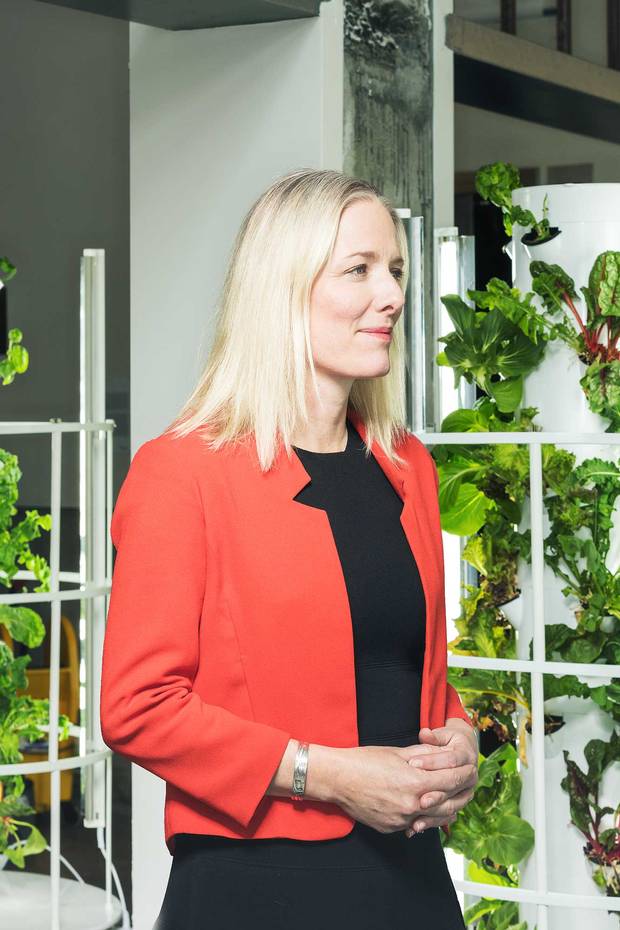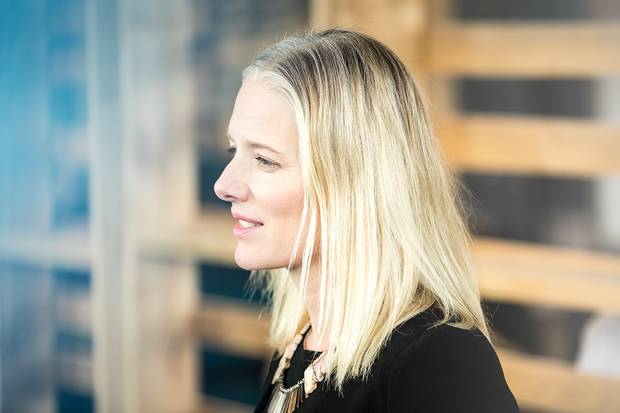Few newly minted cabinet ministers have gone into circulation as quickly as Catherine McKenna. In 2015, barely 79 hours after being sworn in, the Trudeau government's Minister of the Environment and Climate Change—a political neophyte—was flying to France to press her country's position in advance of the Paris climate talks. Then just 44, McKenna took with her years of experience as a trade and human rights lawyer, along with the knowledge gained negotiating the Timor Sea Treaty for the United Nations. Arguably, she was better prepared for Paris than for the spinning-plate act she has taken on since, forced to manage lofty post-Paris expectations beside the bait-and-switch tactics of an integrity-free U.S. administration, while being lampooned from the right as "Climate Barbie" and assailed for the sort of communication mishaps most rookie MPs get to make in relative obscurity. If anything has remained consistent for McKenna as the head of a typically polarizing department, it's her clear desire to be seen as a bridge builder—an environment minister as pro-business as she is pro-clean air.
Hello?
Hi, I'm Catherine McKenna. How're you doing?
Oh. I expected an intermediary.
[Chuckles] I thought I'd just call you.
So let's start. In addition to being the Minister of the Environment and Climate Change, you're also a prominent female politician, so I have to ask you about the other climatic change, the #MeToo movement, that's starting to blow pretty hard through politics in this country.
I've two things to say about what's happening right now. It's across all workplaces and social situations that there has been unacceptable behaviour, from micro-aggressions to sexual assault. Women want to speak out, and we have to create space for that to happen. The second thing is, we need a culture change. And if we're going to have a culture change, people who are in a position of power need to speak up. So my "Climate Barbie" incident—that's a little bit why I spoke up. I had been called Climate Barbie for a long time, and I ignored it. (1) I didn't want to give it any oxygen. Until I had a former Conservative minister call me Climate Barbie (2), and I happened to be in New York working with world leaders on one of the biggest challenges we face. I saw it on social media and decided I'd had enough. I was fed up. So, against the advice of my team, I said, I'm going to call him out on Twitter.
You also had a sort of scrum.
After a ministerial meeting, I went to this scrum, and the first person who asks a question is from an alt-right conservative outlet. Once again, this was not something I really thought out. But I just said, "You know what? I want to talk about the important work I'm doing, and here I have these guys who call me Climate Barbie." So I just decided to push back. My daughters showed me the video afterwards, and you can tell I'm mad and upset. But sometimes standing up and saying things that are unscripted, that you feel, is really important.
Let's touch on how you got here. You had a rich career in law, so why become a politician?
I was not able to do what I wanted to do with the organization I helped start—Canadian Lawyers Abroad. I believed that we needed to play an important and positive role internationally. We needed to work with Indigenous peoples to get to a better place. I cared about the environment and climate change. And I realized that under the Harper government, this was not the direction the country should go. I go to a lot of events that support women in politics, and I thought, You can't just talk about having more women in politics, you have to run.

John Kealey
Your team in Ottawa raised more money than any other riding in Canada and had the highest voter turnout in the country. How do you translate that effectiveness into the work you're doing now?
It's about bringing people together. So I work with environmentalists, with business, with Indigenous peoples, with provinces. In Canada, we're lucky, because most Canadians believe climate change is real. They see the real costs. They also understand that the environment and the economy go together. There is this huge opportunity, and we want to be part of it and figure out a practical way.
You don't have a reliable ally in the United States in this fight. How does that complicate things?
I have a lot of allies; it's just the administration that has taken a different approach. I was in Houston this week. The mayor of Houston is a co-chair of the Climate Mayors in the U.S., and he was talking about wind. Texas—a red state, Republican—has the largest wind resources of any state. In Houston, the mayor told me their electricity system is 89% clean. He's very proud of that. When Donald Trump put out that tweet saying he was out of the Paris agreement, you had a huge shift. It forced some people who had been quieter to stand up and talk about how we needed climate action. You had the CEO of Goldman Sachs—his first tweet was that day, after Donald Trump tweeted. (3) We have a whole swath of businesses. It's not just the Googles and Amazons, it's Anheuser-Busch, it's Mars, it's Coca-Cola, it's Levi Strauss—they're all committed to taking action on climate change. Then you have governors like Jerry Brown, who I work very closely with in California. And it's created economic opportunities for Canada. I was there seeing a Canadian company, CarbonCure, that's using its technology in a cement factory. They take emissions from industry, inject them into concrete and make cheaper, stronger concrete. In Houston, BP Wind Energy is looking for opportunities in Canada, so we talked about Saskatchewan and Alberta.
People see the U.S. administration going backward on climate change, and Canada stands out in contrast. Is there any benefit to being the smart one on the continent?
Absolutely. In California, they really like that we're acting on climate change and we have smart, predictable policies. They like that we accept immigrants, that we can get good people here, and that for highly skilled workers, we're able to turn it around in a week. Another example was the Canada-European Union free trade agreement. The Harper government couldn't get it over the finish line, and Chrystia Freeland, our Minister of Foreign Affairs, freely admits our taking serious action on climate change was extremely important to the Europeans. I was also in China, and they said, "We want your clean air, clean water, clean soil solutions." So I brought over companies with me—I've done that a couple of times now.
You have to negotiate at home too, wrestling with other cabinet ministers on the issues that matter to you. How's that going?
Maybe 50 years ago you could work in silos. Or you could have the Environment Minister fighting the Energy Minister. That's changed. It's extremely important to work across government. You have to work with the Minister of Finance on putting a price on pollution. When it comes to electric vehicles, you have Transportation. When it comes to oil and gas, you have Natural Resources. We need investments in clean technology, so you have the Minister of Innovation. People call me a rookie. Well, in some ways, you come to this without any preconceived notions about how things work. I'm just here to get things done.
You've talked a lot about supporting other countries that need to be weaned off coal. What can Canada do for those nations?
One of the most important things we can do is help drive private-sector financing. Many of these countries want to make the right decision; they just can't afford it. With government money, leveraging private-sector finance, you can do big things. And then also talking about the transition in terms of jobs. We're working on a Just Transition Task Force (4) to help communities and workers, because if people think they're going to lose their jobs and there's not going to be any support, they're going to be less keen.
Brad Wall has left office as Saskatchewan premier. (5) Where do things stand in your negotiations regarding imposing the carbon tax that Wall opposed?
We'll see. Brad Wall clearly didn't believe in carbon pricing. I don't know if he believed in taking action on climate change at all. We know any credible climate plan has to put a price on pollution. Eighty percent of Canadians live in a province where they've done this—Ontario, Quebec, B.C. and Alberta—and they're the fastest-growing economies in Canada. Overall in Canada, we're taking action on climate change, but we've created 400,000 jobs. We're the fastest growing economy in the G7. (6) You can do both.
As minister, have you been to the Arctic yet?
I have been to the Arctic, and let me tell you a story. I was with Students on Ice, a ship that takes Inuit leaders, climate scientists and young people from around the world to the Arctic. On that ship, I met this young Inuit kid, about 14. Right before I was about to leave, he sat down beside me, and he had this piece of paper. He said, "I want to talk to you about the impacts of climate change that I'm seeing in my community. I think they're climate change, but could you tell me if that's right?" And the list broke my heart. He said, "Polar bears are a lot skinnier now. When I go hunting, my foot gets stuck in quicksand, where the permafrost isn't there any longer. The caribou, our country food—we can't find it anymore." And then he said, "A number of my friends' dads have gone hunting, and they've never come home. They've fallen through the ice." As he was looking at me, I knew what he was saying: "So what are you going to do about it?" We know the impacts of climate change; we know we're not doing enough. We've got a huge challenge, and we've got a huge responsibility. We have to figure this out.
1. Ezra Levant's far-right website, Rebel Media, started using the insult as soon as McKenna was named to cabinet in 2015.
2. That would be Saskatchewan MP Gerry Ritz, who resigned last year.
3. Lloyd Blankfein's inaugural tweet read, in part: "Today's decision is a setback for the environment and for the U.S.'s leadership position in the world."
4. McKenna announced the plan at the UN climate conference in Bonn, Germany, focusing on workers who will lose jobs as we shift to green energy.
5. Saskatchewan's new premier is Scott Moe, who had previously served as environment minister.
6. The International Monetary Fund is projecting Canadian GDP growth of 3% in 2018, with the United States in second place at 2.2%.
